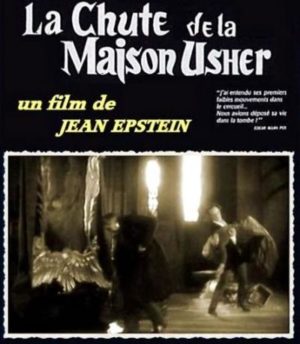 This is one of the first-ever adaptations of Edgar Allen Poe’s classic tale “The Fall of the House of Usher” and still among the most interesting. Initially released back in 1928, it’s a visually stunning piece of silent cinema that, despite flaws, fully earns its classic status.
This is one of the first-ever adaptations of Edgar Allen Poe’s classic tale “The Fall of the House of Usher” and still among the most interesting. Initially released back in 1928, it’s a visually stunning piece of silent cinema that, despite flaws, fully earns its classic status.
THE FALL OF THE HOUSE OF USHER (LA CHUT DE LA MAISON USHER) was made by the famed French avant-gardeist Jean Epstein, one of his few feature-length films and the only one to receive theatrical distribution in the US. With its unprecedented use of special effects and artfully composed images, the film’s impact on European cinema was monumental (subsequent films bearing its influence include Carl-Theodore Dreyer’s classic VAMPYRE and the Quay Brothers’ INSTITUTE BENJAMENTA).
The pioneering filmmaker Abel Gance acted in the film (as did his then-wife Maguerite) and the legendary Spanish surrealist Luis Bunuel worked as an assistant to the director, although the film was NOT (as All Day Entertainment’s DVD cover blurb misleadingly states) a “collaboration” between Epstein and Bunuel. In fact Bunuel really hated the finished product, claiming that, with its heavily stylized visual design, it was a betrayal of the surrealist impulse. But for those horror/cult movie buffs who don’t share Bunuel’s views, THE FALL OF THE HOUSE OF USHER is required viewing, and back in nicely remastered form after years of obscurity, complete with an evocative new score by the renowned music critic/historian Rolande De Cande.
A naive young man travels through a pastoral countryside to a forbidding castle manned by Roderick Usher, a childhood friend. The latter has sent the protagonist an urgent missive speaking of bodily illness and a horrific mental disorder. Once his friend arrives at the House of Usher he finds a decaying structure inhabited by the diseased Roderick, who spends his days feverishly painting portraits of his deceased wife. The place seems haunted, as evinced by the constantly fluttering candles and drifting curtains, not to mention an ever-present sense of death…yet the protagonist finds himself adapting all-too-well to the atmosphere of unearthly gloom pervading the House of Usher.
He soon becomes aware that a young woman lives in the abode with Roderick Usher. It’s the latter’s sister Madeleine, the last descendent of the Ushers, who suffers from a strange malady that’s causing her to literally waste away. Eventually she dies, and Roderick decides to entomb her in a remote vault. The protagonist accompanies him across a rural nighttime landscape to Madeleine’s final resting place—where Roderick for some reason won’t allow anyone to secure the lid on Madeleine’s coffin.
Later that night the protagonist tries to cheer his host by reading from an adventure storybook. But as the storybook narrative grows increasingly dramatic sounds emanate from outside. Roderick becomes quite excited by the idea that the sounds are made by his beloved sister, who was either interred alive or has risen from the dead…
THE FALL OF THE HOUSE OF USHER is very much in keeping with Jean Epstein’s other work (which includes the short “Le Tempestaire”, which can be found in the Kino DVD compilation AVANT-GARDE: EXPERIMENTAL CINEMA OF THE 1920’s AND 30’s) with its textured, poetic visuals that alternate murky dark castle imagery with prosaic shots of the surrounding countryside. Disorientation and subdued repetition are among Epstein’s signature touches, which can at times make for an irritating viewing experience (too much is made of Usher’s paintings, which ultimately have little impact on the narrative), particularly in a film adapted from a short story.
Epstein follows that story fairly closely, though still makes the material very much his own. He may have gotten a bit too enamored of the copious third act optical effects, not unlike modern-day moviemakers who overdose on CGI. Still, Epstein’s effects were ground-breaking for their time, and remain startling, closing the film out in dazzling and unforgettable fashion—proof that, in the hands of a master, even a flawed film can work wonders.
Vital Statistics
THE FALL OF THE HOUSE OF USHER (LA CHUTE DE LA MAISON USHER)
Douris UK Ltd.
Director/Producer/Screenplay: Jean Epstein
(Based on a story by Edgar Allen Poe)
Cinematography: Georges Lucas, Jean Lucas
Cast: Jean Debucourt, Maguerite Gance, Charles Lamy, Fournez-Goffard, Luc Dartagnan, Abel Gance, Halma, Pierre Hot, Pierre Kefer
